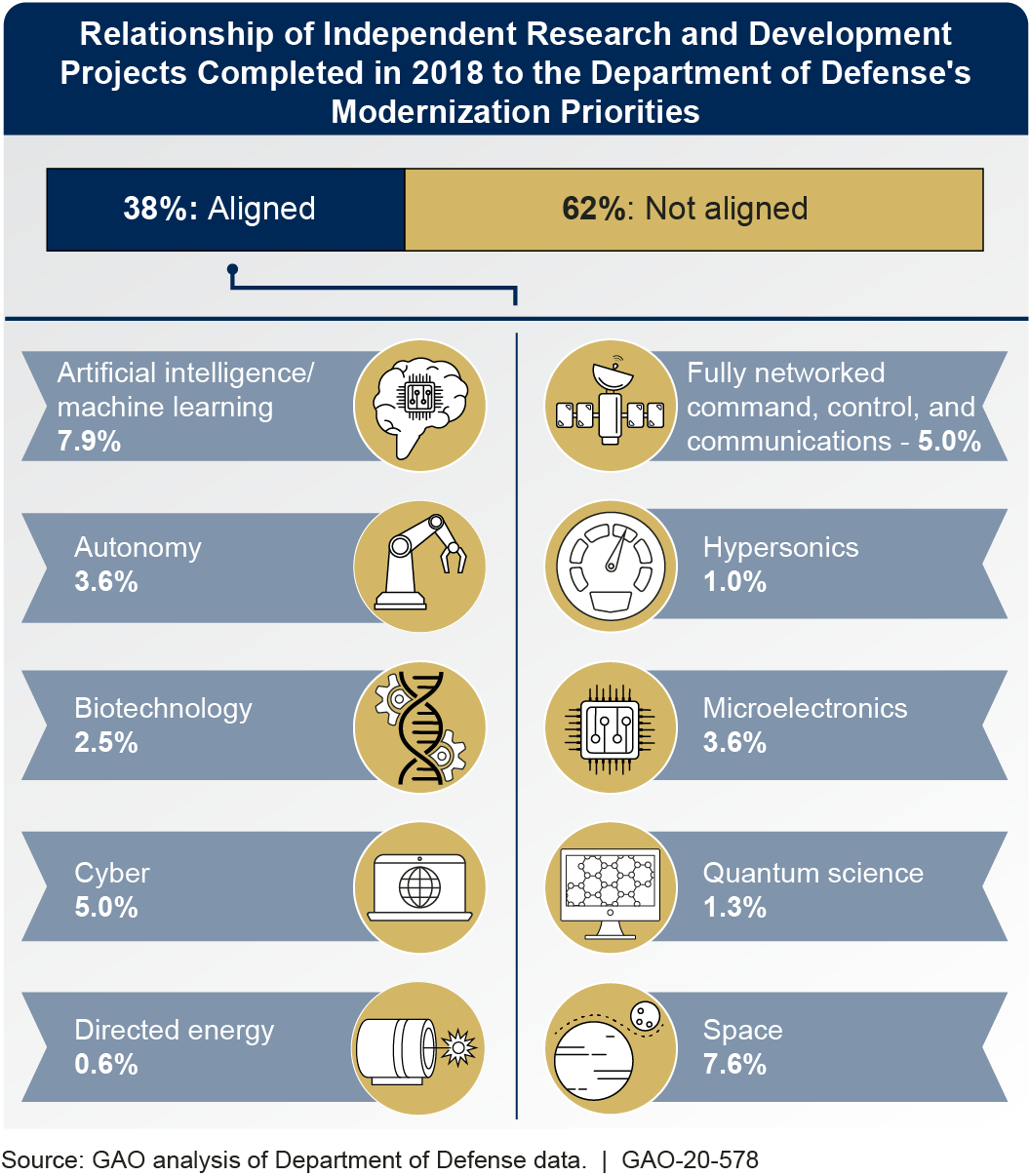Defense Science and Technology: Opportunities to Better Integrate Industry Independent Research and Development into DOD Planning
Fast Facts
At their own discretion, defense contractors can conduct research and development projects of potential interest to DOD and may be reimbursed for some or all of this work. This kind of independent research and development in high-tech areas can help the U.S. military keep a technological edge.
We found that DOD does not review how contractors' independent R&D projects fit into the department's modernization priorities. As a result, DOD risks making decisions about science and tech investments that could duplicate work or miss opportunities.
We recommended DOD take steps to better understand the scope and nature of independent projects.
Independent R&D funds helped produce innovations that led to advanced satellite intelligence, surveillance, and reconnaissance capabilities.

Highlights
Why This Matters
Research and development (R&D) projects in high-tech areas like cybersecurity and biotechnology can help the U.S. military reassert its technological edge.
Contractors decide what independent R&D projects to conduct and the Department of Defense (DOD) reimburses them about $4 billion-$5 billion annually.
More information about those projects could help DOD guide its own R&D investments.
Key Takeaways
DOD does not know how contractors’ independent R&D projects fit into the department’s technology goals. As a result, DOD risks making decisions about its multi-billion dollar science and tech investments that could duplicate work or miss opportunities to fill in gaps that the contributions of private industry do not cover.
DOD has a database of independent R&D projects, but it is not very useful for informing investment decisions because DOD does not obtain information in these and other areas:
- Priority. Contractors do not identify whether a project aligns with any of 10 modernization priorities. The department uses those priorities to make decisions about R&D investments.
- Cost. The database does not capture a project’s complete cost, which could help DOD understand cost implications of future related work.
- Innovation. The database does not include whether a project is a lower-risk, incremental development or a more innovative “disruptive” technology. Disruptive projects carry higher risk of failure but offer possible significant rewards in the long term.
While DOD is not required to review independent R&D projects to understand how they support DOD’s priorities, GAO analysis showed 38 percent of industry projects aligned with DOD’s priorities.

Recommendations
To help DOD better understand the scope and nature of independent projects, we recommend DOD determine whether to require additional information in the project database and review projects annually as part of its strategic planning process. DOD agreed with both recommendations.
How GAO Did This Study
We categorized a sample of completed projects from 2014–2018 by innovation type and analyzed projects completed in 2018 for alignment with DOD's modernization priorities. We also reviewed DOD policies on independent R&D and interviewed representatives from 10 defense contractors.
Recommendations for Executive Action
| Agency Affected | Recommendation | Status |
|---|---|---|
| Department of Defense | The Secretary of Defense should ensure that the Under Secretary of Defense for Research and Engineering revise its IR&D instruction to require USD (R&E) personnel to annually review defense industry IR&D investments to inform DOD's science and technology strategic planning efforts. (Recommendation 1) |
DOD concurred with this recommendation stating that USD(R&E) will investigate and revise its IR&D Instruction to require annual review of defense industry IR&D investments. In March 2022, USD(R&E) officials provided a corrective action plan, which stated that DOD is working to revise its IR&D instruction in response to our recommendation. The plan stated that a draft instruction had been completed and was going through coordination, with an expected completion date of June 2022. However, in January 2023, USD(R&E) officials updated the plan with a new estimated completion date of December 2023. GAO followed up on the recommendation status in July 2023, to which USD(R&E) officials stated that they planned to start reviewing the IR&D instruction the following week and expected to issue a revised IR&D instruction by the December 2023 estimated completion date. However, on November 20, 2023, USD(R&E) officials stated that the estimated issuance date was moved to October 31, 2024. GAO was informed in March 2025, that as of December 2024, the expected completion date for revising the instruction was delayed a year and is now October 31, 2025. According to the Deputy Division Chief of the Directives Division, as of March 2025, work on the instruction has not begun the official process yet. The Deputy Division Chief stated that the current regulatory freeze may be a contributing factor in the delay of closing the recommendation, as the only changes to directives that are currently being approved are in relation to Executive Orders and Secretary of Defense memorandums. As of September 2025, DOD had not provided additional information on the status of its efforts to address the recommendation.
|
| Department of Defense | The Secretary of Defense should ensure that the Administrator, Defense Technical Information Center, assess and determine whether the DTIC IR&D database should require contractors to include additional information on IR&D projects, such as: (a) The IR&D project's linkage, if any, to DOD's modernization priorities; (b) The allowable category (basic research, applied research, technology development, or concept study) to which the IR&D project belongs; (c) The nature of the project as either potentially disruptive or potentially incremental research and development; and (d) The actual IR&D project costs when the project is completed. (Recommendation 2) |
In December 2020, DOD concurred with this recommendation. DOD stated that the DTIC Administrator would (1) assess whether the IR&D database should require contractors to include additional information on projects and (2) recommend any needed changes to the Director of Defense Research and Engineering for Research and Technology. In December 2020, DTIC held meetings with DOD and contractor users of the IR&D database to inform its assessment of potential changes. Following these meetings, DTIC recommended several changes to the database, including updating fields to better communicate (1) IR&D projects' alignment with DOD modernization priorities, (2) the allowable IR&D project categories, (3) disruptive or incremental research and development impact type, and (4) IR&D cost information. In June 2021, the Acting Director of Defense Research and Engineering for Research and Technology endorsed DTIC's recommendations.
|
